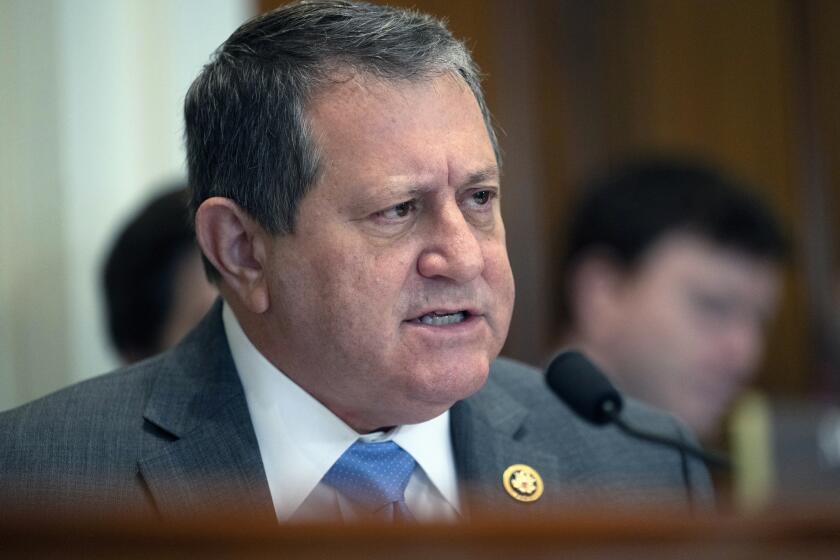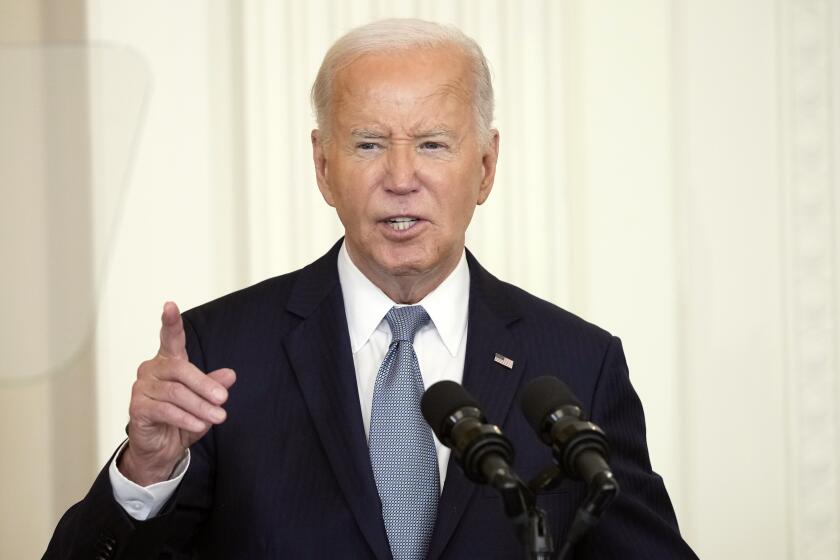Biden faces high stakes as Congress moves toward key decisions

This is the July 9, 2021, edition of the Essential Politics newsletter. Like what you’re reading? Sign up to get it in your inbox three times a week.
It’s crunch time for President Biden and his congressional allies.
After months of negotiations, debates and cosseting of senatorial egos, the time is fast approaching for votes that will determine the success or failure of Biden’s legislative priorities.
Over the next three weeks, the Senate likely will vote on the infrastructure deal that Biden reached last month with a group of Republican and Democratic centrist senators. That will determine whether his main effort at bipartisan policymaking moves forward or collapses.
Get our L.A. Times Politics newsletter
The latest news, analysis and insights from our politics team.
You may occasionally receive promotional content from the Los Angeles Times.
By early August, both houses likely will vote on a budget resolution, a procedural move that determines the scope of the tax and spending bill that Democrats can advance later in the year using special rules to avoid a Republican filibuster.
That partisan spending bill will serve as the Democrats’ main vehicle for putting top priorities into law, including aid to middle- and working-class families, measures to combat climate change, healthcare expansion and, perhaps, a long-sought move to legalize millions of immigrants.
Big plans, small margins
Democrats are trying to enact very large policies with very small majorities — a 50-50 Senate and a five-vote majority in the House. Unity within the Democratic caucus is the key to getting anything done. That means any individual member has huge leverage.
But the tiny margins also create a lot of pressure to hang together.
The next few weeks will test that. Senate rules allow the Democrats to bypass the possibility of a filibuster and pass a package of taxes and spending measures with 50 votes and a tie-breaker from Vice President Kamala Harris. Doing so requires using special budget rules known as reconciliation, the same process they used earlier this year to pass the $1.9-trillion COVID relief package and that Republicans used in 2017 to pass their roughly $1.5-trillion tax cut.
The reconciliation process includes complex rules on what can go into the bill. Leading Democrats hope those rules provide enough leeway to include House-passed measures giving legal status to millions of immigrants currently living in the U.S. without authorization, including young people who came to the country as children, the so-called Dreamers, and close to 1 million long-term farmworkers.
Republicans hope to coax a few Democrats away from supporting any reconciliation bill. That’s part of why some of them back the bipartisan infrastructure deal: They hope moderate Democrats can be persuaded to vote for that and no more. Progressive Democrats fear that could happen and worry about a GOP plot to derail reconciliation.
Other Republicans, however, will refuse to vote for the bipartisan deal either because they dislike the higher spending or oppose the effort the bill makes to increase IRS enforcement of existing tax laws in order to bring in more money. At least 10 Republicans will be needed to pass the bipartisan measure through the Senate, not a sure thing.
The big test on Democratic unity will come with votes on a budget resolution, which is the first step in the reconciliation process and determines the size of the eventual package and its outline. Keeping all 50 Democrats on board means writing a plan big enough to satisfy progressives like Budget Committee Chair Sen. Bernie Sanders of Vermont but not so big that it spooks moderates, including Sens. Joe Manchin III of West Virginia, Mark Warner of Virginia, Kyrsten Sinema of Arizona and Jon Tester of Montana.
In the House, which will vote on the budget resolution first — probably in the last two weeks of July — Speaker Nancy Pelosi faces a similarly daunting task of keeping progressives such as Reps. Alexandria Ocasio-Cortez of New York and Pramila Jayapal of Washington happy while not losing the votes of more conservative members like Josh Gottheimer of New Jersey and Abigail Spanberger of Virginia.
Sanders last month floated the outline of a $6-trillion budget resolution that would include a wide range of progressive priorities, including lowering the Medicare eligibility age to 60, expanding Medicare benefits to include dental work, hearing aids and glasses, and spending billions to combat climate change.
The Vermont progressive is a savvy legislator who knows he’ll have to jettison a lot of that to get a unanimous Democratic caucus. But deciding what to drop involves a difficult balance of political and fiscal pressures.
Conflicting healthcare plans illustrate some of the problems:
Lowering the Medicare age appeals to a lot of voters, but draws powerful opposition from hospitals and doctor groups. A big increase in the number of patients paying Medicare rates would cut heavily into providers’ incomes.
Expanding coverage for dental, hearing and vision benefits doesn’t generate as much opposition, but wouldn’t satisfy many progressives, who see lowering the eligibility age as a first step toward Medicare for all.
Black Democratic lawmakers from the South have a different priority. Many of them, including Rep. James E. Clyburn of South Carolina, a major Biden ally, want to help low-income people in the 12 red states that have refused to expand Medicaid under the Affordable Care Act.
The refusal to expand has left several million people, mostly in Texas and Florida, many of them Black or Latino, without coverage — too poor to get subsidized coverage under Obamacare, but not poor enough to qualify for Medicaid under their home states’ stringent rules.
The White House has its own healthcare priority — extending a provision of the COVID-19 bill that lowers Obamacare premiums for middle-income families. That’s cut costs for hundreds of thousands of consumers this year, but it carries a hefty price tag.
Who gets priority: the elderly, low-income Southerners, or middle-income families? Odds are, the reconciliation bill, even at a cost of trillions of dollars over the next decade, won’t be able to take care of all three.
Similar tough choices will confront negotiators on climate policy, housing, child care and other programs.
In a speech Wednesday at McHenry County College in Illinois, Biden laid out several priorities: Extending for at least another four years the current expanded Child Tax Credit, which administration officials believe can cut the child poverty rate in half; “two years of universal, high-quality preschool for 3- and 4-year-olds” and two years of free community college; expanded child care; 12 weeks of paid family leave; money for affordable housing; and tax credits to spur production of renewable energy.
Jayapal and other progressives have called for more for climate change. Gottheimer and other Democrats who represent suburban districts in the northeast have insisted the bill expand the amount of state and local taxes people can deduct on their federal income tax, reversing a cap the GOP put in place.
It’s all happening at the same time that the administration works to complete the U.S. withdrawal from Afghanistan while trying to stave off the rapid collapse of that country’s government and tries to figure out how to deter cyberattacks on companies, many of which originate with criminals based in Russia.
Summer often provides high drama on Capitol Hill. Four years ago, Sen. John McCain‘s thumbs-down killed the effort to repeal Obamacare, blocking President Trump‘s major legislative goal. Biden won the presidency in part on his promise that he could avoid gridlock. In the next few weeks, the country will find out if he was right.
Enjoying this newsletter? Consider subscribing to the Los Angeles Times
Your support helps us deliver the news that matters most. Become a subscriber.
A wave of baby boomers leaving the labor force
The pandemic caused many baby boomers to retire before they had planned. Don Lee looks at what a wave of early retirements could mean for the economy.
Workers aged 25 to 54 have been moving quickly back into the labor market. Those 55 and older, not so much, Lee reported. Many who left their jobs don’t plan to come back. That could reverse a trend of the last two decades in which more older workers delayed retirement. Right now, the slow return is worsening labor shortages in many industries. If the trend persists, it could create additional economic problems.
Biden’s strategy
Biden’s balancing of bipartisanship and Democrats’ demands tests his presidency, Janet Hook and Eli Stokols wrote.
He still faces difficult odds, but he’s been drawing praise from progressives who used to disparage him.
“I’ve not historically been a Biden guy, but I’m astonished about how well he is doing,” said former Vermont Gov. Howard Dean, the former party chair. “What we thought were going to be his liabilities have turned into huge assets.”
Biden’s trip to Illinois this week illustrated his effort to shore up his agenda and Democrats’ chances in swing districts, Stokols reported.
The withdrawal from Afghanistan
As the Taliban gains ground, Biden defended the U.S. exit from Afghanistan, while not denying that the future there could be grim, Chris Megerian reported.
Biden knows Afghanistan will get uglier. No wonder he’d rather not talk about it, Doyle McManus wrote.
Tracy Wilkinson examined administration assurances about Afghanistan; they don’t always reflect the reality on the ground, she wrote.
Bolstering voting rights
Vice President Harris says Democrats will spend more to register voters as Republican states pass laws that could limit voting, Noah Bierman reported.
The latest from California
California Atty. Gen. Rob Bonta is launching two teams to investigate fatal police shootings, Patrick McGreevy reported. Bonta said he expected the new teams, one for Northern California and one for Southern California, would investigate 40 to 50 fatal police shootings each year based on historic trends.
George Skelton looked at the effort by Republican Kevin Faulconer, the former San Diego mayor, to run his recall election campaign as a policy wonk.
Mark Barabak examined the dilemma that Trump creates for Republicans in California and the varying approaches taken by GOP candidates, including Faulconer, Caitlyn Jenner and Lanhee Chen, a former top advisor to Mitt Romney‘s presidential campaign who is running for state controller.
Gov. Gavin Newsom, meantime, is running his campaign against the recall by touting, and sometimes exaggerating, elements of his budget, Taryn Luna wrote.
This week, however, Newsom asked all Californians to voluntarily reduce water usage by 15% amid the worsening drought, Luna reported.
One of the Newsom administration’s biggest trouble spots has been the state’s unemployment benefits program. This week, despite the problems, the state extended its contract with Bank of America to issue debit cards that pay benefits, McGreevy reported.
Programming note: The Essential Politics team is taking some time off this month. We won’t be sending newsletters on Friday, July 16 and Friday, July 23, but you can still keep up with the week’s political news from Washington and Sacramento in our Monday and Wednesday newsletters.
Stay in touch
Keep up with breaking news on our Politics page. And are you following us on Twitter at @latimespolitics?
Did someone forward you this? Sign up here to get Essential Politics in your inbox.
Until next time, send your comments, suggestions and news tips to politics@latimes.com.
Get the L.A. Times Politics newsletter
Deeply reported insights into legislation, politics and policy from Sacramento, Washington and beyond. In your inbox three times per week.
You may occasionally receive promotional content from the Los Angeles Times.




